
And I’d Do It Again: Books We Wish We Could Read Again for the First Time
Sometimes a reading a particular book can be so amazing, so life-changing, or so personal, that when other people read it, you feel envious that you can’t experience it for the first time all over again. They’re not always the best books you’ve ever read, just books that made a difference in your life when you read them.
Here’s a list of books Rioters wish they could read again for the first time. Tell us yours in the comments!
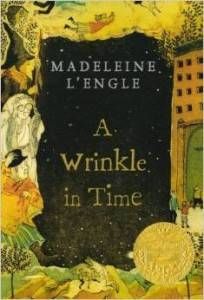 A Wrinkle in Time by Madeleine L’Engle My copy of A Wrinkle in Time is, well, wrinkled at this point. The cover is coming off, and it tends to flop open at my favorite chapter. That’s because I’ve been reading it, on and off, for almost 25 years. At this point, I’ve developed habits around reading it. I read my favorite parts slowly and skim the rest. I wish I could go back and experience the book as a whole, as it’s meant to be read, again, without anticipating what’s going to happen next. – A.J. O’Connell
A Wrinkle in Time by Madeleine L’Engle My copy of A Wrinkle in Time is, well, wrinkled at this point. The cover is coming off, and it tends to flop open at my favorite chapter. That’s because I’ve been reading it, on and off, for almost 25 years. At this point, I’ve developed habits around reading it. I read my favorite parts slowly and skim the rest. I wish I could go back and experience the book as a whole, as it’s meant to be read, again, without anticipating what’s going to happen next. – A.J. O’Connell
The Library At Mount Char by Scott Hawkins This is one of those questions I can probably come up with a long list of answers to–ranging from favorite childhood books (Matilda) to great thrillers I’d like to forget the “twist” to–but rather than driving myself insane trying to pick one, I’m going to go with a recent read. The Library At Mount Char was SO bananas, and awesome, and I desperately needed to know what was happening that I inhaled the book too quickly. I wish I could read it again, slowly, taking in each detail, character, and story. – Jamie Canaves
Tracks by Louise Erdrich In some ways, this was a great door opening to the rest of Erdrich’s work. I had come across her before, but this book revealed her power. In other words, this novel was the beginning of a wonderful relationship with Erdrich’s stark yet beautiful magical reality. It made me value folklore, the struggle of producing it, and a window into a culture. After this book, something opened in my brain and I went seeking other works like hers and other authors. I borrowed the novel at the time of reading it and now that I’ve written this little post, I’m going to have to buy it and reread. Then hug it. – Jessi Lewis
 The Secret History by Donna Tartt You know those people who re-read Harry Potter over and over again because they love the experience of going back to Hogwarts? For several years that was me with The Secret History, and yes I know this isn’t about wizards but a group of cerebral misfits, and yet it had the same kind of draw. It was also the book that pulled me out of the classics and brought me into contemporary fiction. Before that, I didn’t know that a brand new book could make me as excited as something in the “canon.” I would love to read this book for the first time. Now each re-reading is almost too familiar, hitting those same notes, going through the same motions, with no room for surprise. I’d love to meet these characters for the first time all over again. – Jessica Woodbury
The Secret History by Donna Tartt You know those people who re-read Harry Potter over and over again because they love the experience of going back to Hogwarts? For several years that was me with The Secret History, and yes I know this isn’t about wizards but a group of cerebral misfits, and yet it had the same kind of draw. It was also the book that pulled me out of the classics and brought me into contemporary fiction. Before that, I didn’t know that a brand new book could make me as excited as something in the “canon.” I would love to read this book for the first time. Now each re-reading is almost too familiar, hitting those same notes, going through the same motions, with no room for surprise. I’d love to meet these characters for the first time all over again. – Jessica Woodbury
Dreams From My Father by Barack Obama Not to be dramatic? This book changed my life. When I first read it, in 2005, I was deeply entrenched in the rhetoric of Sean Hannity and other Fox News personalities. I had strong negative opinions about Democrats in general, though I think President Obama’s book was the first time I ever allowed myself to listen to one. And I loved everything about Dreams. I grew for his insights on how racism is experienced, how class differentials operate, and on how we are formed by our connections to our family pasts. My connected political transformations weren’t immediate–for a while, I let myself think of then-Senator Obama as “the one good Democrat”–but when the same pundits whose “insights” I’d relied upon started attacking him in 2008, I was armed against their untruths with the reality of Dreams. Years later, I’m embarrassed about where I was when I first read it, so I haven’t gone back. I’d love to experience Dreams afresh from this political vantage, and see how it strikes me sans preconceived notions of who Democrats–or anyone, really–are allowed to be. – Michelle Anne Schingler
Pillars of the Earth by Ken Follett This was the first book I read that enraptured me so completely that I dreamed about it at night. I was completely caught up in every storyline, not just the “main characters.” The character building was slow and thorough, while the plot was easy to follow. Many book of this magnitude cause me to keep a notebook of who’s who and notes about subplots. Not so with Pillars. Not only did I not have to keep a notebook what was going on, but I couldn’t stop thinking about the characters. It was also the first historical fiction I read with minute historical details that I didn’t find distracting or Dickens-style overly detailed. It opened new genres for me I had been previously closed off to before and taught me about the benefits of reading outside my comfort zone. – Nikki DeMarco
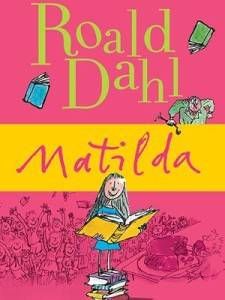 Matilda by Roald Dahl I hope that in your life you have or will come across a book that seems written for you. When I picked up Matilda as a shy, quiet child, I remember thinking for the first time that perhaps specialness isn’t the exclusive property of the beautiful extroverts, but that bookish loners could also claim it. And as a soft-spoken kid, discovering the streak of wild daring and puckishness in unassuming Matilda was thrilling and inspiring. Dahl was so good at creating characters that are more than they seem. It wasn’t even necessarily Matilda’s magical gift that defined her specialness, it was that she used her many hidden abilities to fight on the side of the ignored and belittled. While I can’t recreate that first personal revelation I gained from Dahl’s story, Matilda is a book I return to time and again when I need reassurance. It has become one of my dearest friends. – S. Zainab Williams
Matilda by Roald Dahl I hope that in your life you have or will come across a book that seems written for you. When I picked up Matilda as a shy, quiet child, I remember thinking for the first time that perhaps specialness isn’t the exclusive property of the beautiful extroverts, but that bookish loners could also claim it. And as a soft-spoken kid, discovering the streak of wild daring and puckishness in unassuming Matilda was thrilling and inspiring. Dahl was so good at creating characters that are more than they seem. It wasn’t even necessarily Matilda’s magical gift that defined her specialness, it was that she used her many hidden abilities to fight on the side of the ignored and belittled. While I can’t recreate that first personal revelation I gained from Dahl’s story, Matilda is a book I return to time and again when I need reassurance. It has become one of my dearest friends. – S. Zainab Williams
Slowness by Milan Kundera The first time I read this book I had what I think is the exact reaction the author intended: I slowed down, got into the mood, and just enjoyed the heck out of every page. The book is a slim one, with Kundera (as himself) at a French chateau on vacation telling a story that eventually weaves in several other stories: a Chevalier from eighteenth-century France visits the chateau and has a long, drawn out, extremely sensuous affair; while a friend of Kundera makes his own pick-up attempt, in real time real life. It’s all about recognizing that we live in a very fast paced life, and allowing a brief escape from that, to enjoy the finer details the world offers. It’s beautiful, but now every time I read it I just want that first-time feeling back, and sadly, it just doesn’t come. – Alison Peters
Any Discworld book by Terry Pratchett Terry Pratchett got me back into reading after a very, very long drought. I picked up a Discworld book at random–Making Money, maybe, or Going Postal–and I was hooked immediately into his world. His on-point satire also has an enormous dose of heart that keeps me coming back and back again for characters that I love; meeting them again for the first time would be fantastic (especially since Sir Terry is no longer with us). – Susie Rodarme
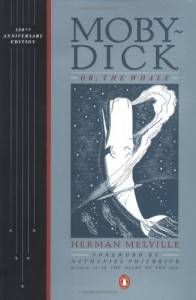 Moby-Dick by Herman Melville I first read Moby Dick when I was a kid. I’m talking like, when I was 10. My parents loved buying me classic novels, and in the case of Moby-Dick, had picked me up a watered-down version of the epic, with illustrations and bigger text for younger kids. I remember devouring that book as a kid, and then, when I was a teenager, revisiting the original. I marveled at how the book seemed to be about EVERYTHING, and gushed to my many friends who rolled their eyes. I’d love to have that feeling again with that book, the discovery that there was so much more to a story I thought I’d known years ago. Maybe I’ll read one of those “classics for kids” type books, a version of a classic I’ve yet to read, and try it again. Probably won’t be the same though. – Eric Smith
Moby-Dick by Herman Melville I first read Moby Dick when I was a kid. I’m talking like, when I was 10. My parents loved buying me classic novels, and in the case of Moby-Dick, had picked me up a watered-down version of the epic, with illustrations and bigger text for younger kids. I remember devouring that book as a kid, and then, when I was a teenager, revisiting the original. I marveled at how the book seemed to be about EVERYTHING, and gushed to my many friends who rolled their eyes. I’d love to have that feeling again with that book, the discovery that there was so much more to a story I thought I’d known years ago. Maybe I’ll read one of those “classics for kids” type books, a version of a classic I’ve yet to read, and try it again. Probably won’t be the same though. – Eric Smith
The Spirit Catches You and You Fall Down by Anne Fadiman I don’t remember when I first read this book, but it changed my ways of thinking in two significant ways. It was the first book I remember reading that showed me what a really great narrative nonfiction writer can do, making a true story read with the same ferocity and impact as fiction. More significantly, it was the first book I read that showed me that even good people can make irreversible mistakes when they don’t take the time to truly understand some of our deep cultural differences. It’s a book I’m afraid to reread because I love it so much… I wish I had the chance to read it again. – Kim Ukura
The Harry Potter series by J.K. Rowling I am a total Potterhead, and I write this with a lot of pride! Even though I love re-reading the HP books when I am feeling nostalgic, I do find myself getting a bit bored because I know what’s coming. I would give anything to go through it all again, without knowing what Severus Snape is all about and that it all ends well for Harry, Hermione, and Ron. I feel like the magic has been somewhat ruined because I already know the story so well, so this was a no-brainer for me. – Nicole Froio
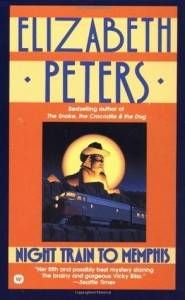 Night Train to Memphis by Elizabeth Peters I first read this book in fifth grade, and it used to be my go-to comfort read. While objectively speaking it’s not the best book in the Vicky Bliss series, it’s the first one I read, and I do tend to remain loyal to my firsts. Not to mention the fact that it takes place on a Nile cruise, the heroine’s an art historian (over identify much, Tasha?), and she’s surrounded by handsome Egyptologists and dashing art thieves. I’ve read it so many times I lost count, and that’s why I wish I could read it again–it just doesn’t offer the same sense of escapism as it used to. I find myself anticipating all the twists and turns instead of just relaxing into story, and I inevitably stop a few hundred pages in and move on to something else. Sadface. – Tasha Brandstatter
Night Train to Memphis by Elizabeth Peters I first read this book in fifth grade, and it used to be my go-to comfort read. While objectively speaking it’s not the best book in the Vicky Bliss series, it’s the first one I read, and I do tend to remain loyal to my firsts. Not to mention the fact that it takes place on a Nile cruise, the heroine’s an art historian (over identify much, Tasha?), and she’s surrounded by handsome Egyptologists and dashing art thieves. I’ve read it so many times I lost count, and that’s why I wish I could read it again–it just doesn’t offer the same sense of escapism as it used to. I find myself anticipating all the twists and turns instead of just relaxing into story, and I inevitably stop a few hundred pages in and move on to something else. Sadface. – Tasha Brandstatter
Jane Eyre by Charlotte Brontë The beautiful writing makes this a joy to read every time, but I loved the suspense of not knowing what would happen the first time I read it when I was a kid. I wish I could recover the sense of mystery the book had when it was still new to me. – Kate Scott
Life After Life by Kate Atkinson Life After Life is so intricately constructed, and with such elegance, that reading it for the first time felt like magic. How could a book with such a complex structure—filled with layered timelines, repeated scenes, and subtle shifts—work so well? How could any book work so well? Any time you get to read Life After Life is a good time, but reading it again for the first time would be especially magical. – Derek Attig
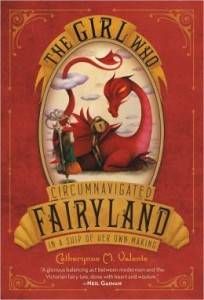 The Girl Who Circumnavigated Fairyland In a Ship of Her Own Making by Catherynne M. Valente I read this book early in my career as a bookseller specializing in children’s books. I wasn’t super invested in kids books when I began the job, and I think Valente’s series is what really opened my eyes to the rich world of kids books that I’d been missing since “graduating” to adult books. I had such a visceral, positive reaction to this book (I wrote one quote on my arm immediately upon reading it) and, to date, it’s my most handsold kids’ book. I’d love to meet September, Saturday, and Ell again for the first time; to visit Fairyland and its provinces (especially my favorite, Autumn, with its town made of bread); and to read the end with a plot twist I honestly didn’t see coming. – Emma Nichols
The Girl Who Circumnavigated Fairyland In a Ship of Her Own Making by Catherynne M. Valente I read this book early in my career as a bookseller specializing in children’s books. I wasn’t super invested in kids books when I began the job, and I think Valente’s series is what really opened my eyes to the rich world of kids books that I’d been missing since “graduating” to adult books. I had such a visceral, positive reaction to this book (I wrote one quote on my arm immediately upon reading it) and, to date, it’s my most handsold kids’ book. I’d love to meet September, Saturday, and Ell again for the first time; to visit Fairyland and its provinces (especially my favorite, Autumn, with its town made of bread); and to read the end with a plot twist I honestly didn’t see coming. – Emma Nichols
The Sandman by Neil Gaiman This ten-volume collection, along with some of the mini-series and recent collection, is one of the most important works of my teenagedom, firing my rocket brain off to imagination spaces unknown. Gaiman’s The Sandman showed me the true power of the comic book medium, and what happened when you stopped playing with conventional plots. The King of Dreams must learn to change or die, and makes his choice; that’s the running arc of the whole series. But The Sandman was so much more than that: it was about story itself, about how myths and dreams and fables, and the power that each of these things have in our own lives to help us overcome adversity, deal with grief and trauma, ascend the cruelty of the world, and learn how to live well and how to be good and how to treat others. I’d not trade my teenage years reading them, and how they influenced me, but the chance to go back and meet Morpheus, Matthew the Raven, Lucien the Library, Fiddler’s Green, and the ever lovely, Death? That would be quite a story, indeed, and one I’d love to read. – Martin Cahill
Pride and Prejudice by Jane Austen I love this book and have, like some sort of romantic comedy stereotype, read it every few years. I first read it at school, though, and I can’t help wishing my first time with it had been less about classrooms, essays, and exams and more about discovering Mr. Darcy for myself on a library bookshelf. – Rachel Weber
Don Quixote by Miguel de Cervantes I read DQ when I was 15 because at that time I had the urge to read every massive, classic novel I could get my hands on. When I started it, I assumed that it would be stodgy and/or boring because it was written so many centuries ago, but BOY was I surprised to find myself laughing hysterically with each passing chapter. The energy, comedy, and sheer ridiculousness made me giddy, and I understood more clearly then that great novels could be both accessible and enjoyable- and even hilarious. – Rachel Cordasco
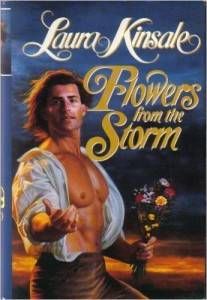 Flowers From the Storm by Laura Kinsale I had discovered romance a short time before tackling this classic historical romance. (You know how I get mad when people say Fabio is on the cover of all romance novels? Okay, well you can say that about this one, because he was, and what over the top Fabiosity it is.) It’s one of those wacky plots only Kinsale can sell: A brilliant mathematician who is also a roguish duke has a stroke, the world thinks he’s “gone mad” and his scheming family tries to lock him away. But a demure, observant Quaker woman ends up, though a set of coincidences, becoming his support, his defender, and his champion, despite thoroughly disapproving of his materialistic ways. The intensity of the romance floored me. I rarely cry at fiction, but I was in tears several times reading this one. I think what makes it so special to me is not just how much I loved it (the audio version is also superb) but that it was the most complex and beautifully written romance I had read until that point. I didn’t think romance novels could be judged on the same merits as other kinds of fiction. Now I know better. – Jessica Tripler
Flowers From the Storm by Laura Kinsale I had discovered romance a short time before tackling this classic historical romance. (You know how I get mad when people say Fabio is on the cover of all romance novels? Okay, well you can say that about this one, because he was, and what over the top Fabiosity it is.) It’s one of those wacky plots only Kinsale can sell: A brilliant mathematician who is also a roguish duke has a stroke, the world thinks he’s “gone mad” and his scheming family tries to lock him away. But a demure, observant Quaker woman ends up, though a set of coincidences, becoming his support, his defender, and his champion, despite thoroughly disapproving of his materialistic ways. The intensity of the romance floored me. I rarely cry at fiction, but I was in tears several times reading this one. I think what makes it so special to me is not just how much I loved it (the audio version is also superb) but that it was the most complex and beautifully written romance I had read until that point. I didn’t think romance novels could be judged on the same merits as other kinds of fiction. Now I know better. – Jessica Tripler
We Have Always Lived in the Castle by Shirley Jackson I read this book when I was eleven, simply because I saw it sitting in my teacher’s bag by her desk. I was curious to read what a grown-up was reading. (No, I didn’t swipe it – I got my own copy.) The copy I had didn’t have a description on it, so I went in not knowing what I was about to read. And holy cats – I could not believe what I was reading! It’s a story told by a teenage girl, about her family. But not a normal family. It was so sinister and strange. I had no idea books could do that! For the first time I realized just how much stories can wriggle and transform in your hands. And the ending! It must have been such a mind-blower when it came out. Now practically every story told strives to have a twist. This book, it was magic. It is still magic. Evil, brilliant magic. – Liberty Hardy





